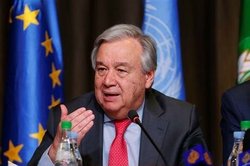 Speaking at one of Sunni Islam’s most prestigious universities, the United Nations chief warns about the unbridled spread of Islamophobia across the international community, weeks after a shocking terror attack that killed dozens of Muslim worshipers at two mosques in New Zealand.
Speaking at one of Sunni Islam’s most prestigious universities, the United Nations chief warns about the unbridled spread of Islamophobia across the international community, weeks after a shocking terror attack that killed dozens of Muslim worshipers at two mosques in New Zealand. RNA - Anti-Islam hate speech is “entering the mainstream, spreading like wildfire through social media,” said UN Secretary General Antonio Guterres during his speech at al-Azhar University in the Egyptian capital, Cairo, on Tuesday, the Middle East Eye news portal reported.
“Around the world, we are seeing ever-rising anti-Muslim hatred, anti-Semitism, racism, and xenophobia,” he added. “We see it spreading in liberal democracies and as well as in authoritarian states.”
He cited the March 15 mass shooting by a self-confessed white supremacist that killed 50 Muslim worshipers at the mosques in Christchurch city as an instance of where anti-Islam hatred could go if unchecked.
Prior to the massacre, the Australian terrorist involved in the mass shooting had published an ideological “manifesto” filled with extreme views, in which he described Muslim immigrants in Europe as “invaders.”
Reacting to the crime, over 350 Muslim leaders from the UK, the US and other world countries signed a letter to The Guardian, in which they condemned the assault as “the awful outcome of systemic and institutionalized Islamophobia.”
They slammed the mainstream media, politicians and academics around the world for fueling “bigotry” and “hatred” against Muslims in their societies and said the Muslim massacre was “inspired by hatred of Islam and Muslims.”
Human rights woes under Sisi
Later, he is scheduled to meet with Egyptian President Abdel-Fattah al-Sisi, who has been under fire globally for pursuing a violent campaign of suppression against dissidents.
Human rights activists have urged the UN chief to raise widespread reports of human rights abuses in the country with the military-backed president.
Amr Magdi, a researcher at New York-based Human Rights Watch, tweeted, “Today, UN chief is in Egypt to meet President Sisi, the third such meeting.”
“He failed to raise human rights abuses before. In a country witnessing the worst human rights crisis in its recent history, failing to raise concerns would be larger than a mistake,” Magdi added.
Sisi, as a former army chief, led a military coup against the country’s first-ever democratically-elected president Mohamed Morsi and overthrew him on July 3, 2013.
Human rights groups have regularly criticized Sisi’s government for cracking down on opposition activists and supporters of Morsi’s Muslim Brotherhood movement, which has been banned in the country.
In January, Amnesty International cautioned that Egyptians under Sisi were facing an unprecedented campaign of suppression targeting freedom of expression. The North African state has turned into an “open-air prison” for dissidents, the UK-based rights body said at the time.
Rights groups say the Army’s crackdown on the Muslim Brotherhood, Morsi’s party, which has been banned in Egypt, and its supporters has resulted in the deaths of over 1,400 people. About 22,000 others have been arrested, including more than 200 people, who have been sentenced to death in mass trials.
847/940